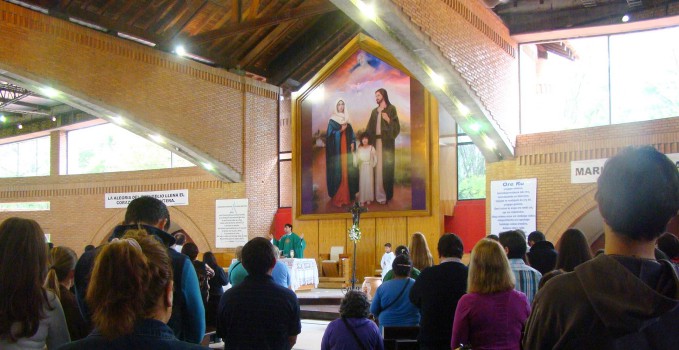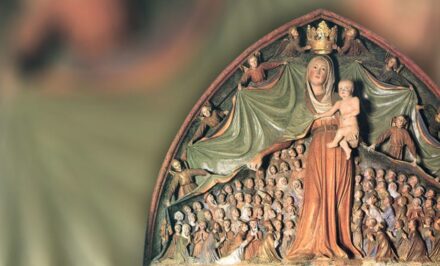Sarah –Leah Pimentel – text of a talk given in a parish in Cape Town •
The family is in crisis. These are not my words. Pope Francis has said this time and time again.
And we can see that it is true. We just need to look around us. Not one of us is untouched by a family in crisis.
For some, it is the hurt of a broken relationship – a marriage that failed, children who have left and want nothing to do with their parents, siblings who don’t speak.
For others it is trust that has eroded – through infidelity, abuse or neglect, or even the inability to love.
Hurting
There are families that are hurting because of distance. Perhaps war and economic difficulties have driven some of us here, and other members of our families are scattered throughout the world. No matter how much time passes, whether it is one year or forty, we never stop missing those who are far away. And nothing can replace the physical presence of those we love.
Economic difficulties place a huge strain on families. Disagreements about how to manage money or the psychological suffering of family members who cannot find work which is accompanied by the anger and loss of self-worth of not being able to contribute to the household. And often, family is the first to suffer the venting of these frustrations.
A call for prayer and action
Yes, the family is in crisis. But this should not be a cause for despair. Instead it is a call for prayer and action. That is why we are gathered here this afternoon. As we bring our prayers before the Sacred Heart to Jesus, let us pray for families. Let us pray for family life. We pray also for the Synod on the Family that is happening in Rome as we speak. Bishops from all over the world are gathered in the Vatican to prayerfully look at family life and find good ways in which the Church can support all families. The decisions they make will focus the actions of every parish so that parishes will be places of mercy and healing for families that are suffering. They will also be a support for the many families who, despite many challenges, are able to love up to the ideals of love and family life.
Pope Francis` messages to families
This is perhaps why, this afternoon, it is good to reflect a little bit on some of Pope Francis’ messages to families. Every Wednesday, the Holy Father meets with the thousands of pilgrims who come to St. Peter’s Square in Rome and he offers a short catechesis. Over the last year, he has focused on the family.
I invite each of you to go to the Vatican website and read these Wednesday audiences.[1] They provide a world of insight and wisdom into fostering good family life, as well as some of the difficulties that the family encounters today.
I will touch on just some of these messages this afternoon.
In the very first catechesis of the year, Pope Francis started by looking at the role of mothers. He praises mothers, saying that they are the “strongest antidote to the spread of self-centred individualism” because by choosing to give life, mothers are focusing on something beyond themselves. Women who become mothers have to give up many things, but they do so out of unconditional love for their child. In fact, says Pope Francis, “without mothers society is dehumanized.” Let us pray that every mother can truly be the centre of her home.
Pope Francis also expressed his concern that we have become a “society without fathers.” He observed that many social ills are directly linked to absent fathers who are not there to transmit examples and values to their children. Just a couple of weekends ago, I heard young people at Schoenstatt speak about their fathers and how grateful they were to have dads who were present, who took time to be with them and share their experience of life with them. Today, let us pray for fathers, that they will have the courage to be present in their families and be an example of God, the loving Father.
Pope Francis devoted a significant amount of time to children, saying that they are always a gift. They carry within them our memories of the past and our hope for the future. Isn’t that a beautiful image? In the sterile society we live in, we often hear about children as being a burden, but Pope Francis describes them as a gift. In many of our African cultures, we still have that sense that all life is a blessing. Let us work to preserve that. The real blessing is that children reveal to us a love that is freely given. Children do not do anything to “deserve” love, but simply their presence calls upon us to love and care for them.
Children are the first to receive and give love, but they are also the “first victims” when a marriage breaks down. Pope Francis encourages parents who find themselves in that situation not to use their children as pawns in the battle of wills between the two parents, but that each parent speak well of the other in front of their child. This is a hard thing to do, but it is good practical advice to try and follow, so that our children don’t become resentful.
It’s difficult growing up in today’s environment, so let us pray that each child who is born can grow up with a good support structure at home that will allow them to navigate the confusing world of school and adolescence.
When we talk about family life, we often forget about the elderly. They are often seen as a burden for society as they are no longer productive. Again, Pope Francis asks us to look at old age differently, saying that “elderly are a wealth not to be ignored.” The elderly are our common memory bank because they carry our family histories and help us to shape our identity. They also have a special ability to pray. They have to time to pray very personally for each person who asks them for their prayers.
Many of our Church communities are largely made up by older people. Let us give thanks that they are so willing to intercede for us. And let us pray that God will answer their prayers and secret dreams.
And on top of all this, what underpins family life? What gives life to the reciprocal love between spouses, between parents and children, between the different generations? The sacrament of marriage. Pope Francis says that we need to “return marriage and the family to the place of honour.” This means that in a culture where marriage is seen as irrelevant and non-permanent, Christian marriages must increasingly become a testimony of “radical devotion” between the two spouses, because in the sacrament of holy matrimony, the couple becomes a “medium of God’s blessing and for the Lord’s grace to all.”
How do we as Church support strong families?
This brings me to a question that has increasingly been occupying my thoughts recently, and is the focus of the Synod underway in Rome. How do we as a Church support strong marriages? How can we support family life? The challenges that couples and families experience today are immense. Are they able to find in the Church an oasis, a place to reaffirm the value of continuing to be married of continuing to strive for Holy Families? Do we have programs for families? Are newly married couples accompanied in this life changing decision they have made? I’m not speaking only about marriage preparation classes. Older couples who have experienced the joys and sufferings of marriage are the perfect companions for young couples as they set out on their journey. The wisdom of those who have been married for 30 and 40 years are a huge wealth that parishes can tap into.
Do we have programs for children and teenagers beyond the weekly catechism that enables young people to meet other young people of similar values? Is there a platform where they can discuss the things that trouble them and receive godly advice? Do we have practical formation sessions to assist parents to raise their children in a Christian environment? We take it for granted that parents know what to do, but years of teaching catechism has shown me that parents are not at all certain about their role in the religious formation of their children.
So perhaps as we leave here today, continue to pray daily for families, and our own families. They need our prayers. But it is just as important to create structures in our own families and in our parish communities that allow us to support families and to welcome families that are hurting and broken, so that they can also receive Christ’s healing.
The Holy Family
I invite you to join me in a short reflection on the Holy Family, who also experienced the difficulties of family life.
Am I like Mary, who said yes to God’s plan and was open to life, even if that meant the death of her reputation and possibly her future marriage to Joseph. Am I open to the prospect of new life? Am I ready to say yes to the arrival of a new child, even if the circumstances are not always ideal?
Am I like Joseph, who in all things walked beside Mary? He could have left her when he found out about her pregnancy, but yet he had the courage to walk with her through life, including exile in Egypt and poverty of a dusty town in Galilee? Do I have the courage to take responsibility for those who have been placed in my care? Do I walk beside my wife and support her in all things?
Are we parents like Joseph and Mary? We often don’t understand the choices that our children make and sometimes we lose them on the way home from the temple. Do we trust that we have given them the best upbringing we can and leave the rest in God’s hands? We may suffer like Mary when she stood at the foot of the Cross and watched her only son die. Some of us have lost our children. Are we able to remain faithful like Mary?
Does our family live in a place of uncertainty and fear? We remember that the Holy Family heard the angel’s voice in a dream and fled into Egypt to save their child. We cannot control the world around us, but is our home a safe haven and a place of nurturing? Do we hear the voice of God in the events in our own families and, like the Holy Family, do we respond in faith that God will take care, even in the most dire circumstances?
Am I like the child Jesus? The Bible tells us that even though Jesus was the Son of God, he submitted to his parents in all things. Do I listen to the counsel of my parents? Do I try my best to not bring them anguish? As they become older, do I spend time with them and care for them in their old age?
Holy Family, you lived in very different times, but we recognize that your family life was not perfect. But yet you trusted that God would guide you every step of the way. Show us how to trust in God’s plan for our families and teach us to become more like you. Teach us how to love unconditionally. Teach us how to care for our children. Help us to discern how we can make our families into holy families that stand out as a beacon and a light for a world that has forgotten the value of family. We ask this in Jesus’ name. Amen.














